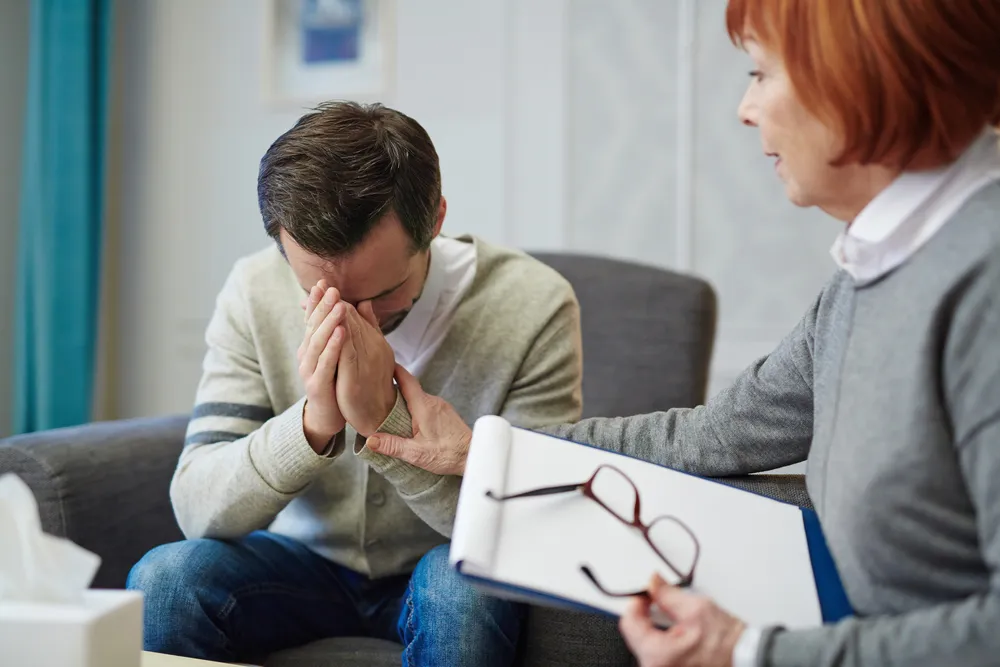Do you want to know the potential signs of a mental breakdown in a man or woman? If yes, you are in the right place to know the signs of a mental breakdown and how to cope with it.

A mental breakdown, also known as a nervous breakdown or a psychological collapse, is a severe and overwhelming period of mental distress.
Also, a mental breakdown refers to a period of intense mental distress where an individual is unable to function normally in daily life. It often involves a sudden onset of overwhelming emotions and may include symptoms of anxiety, depression, or psychosis.
Recognizing the signs of a mental breakdown is crucial for timely intervention and support. Here you will get to know the common indicators, causes, coping strategies, and preventive measures related to mental breakdowns.
Signs of a Mental Breakdown

Here are potential signs of a mental breakdown:
1. Having Overwhelming Anxiety
Overwhelming anxiety that disrupts daily life is a key sign of a mental breakdown. This type of anxiety is characterized by persistent and intense worry that can manifest in various ways. This includes panic attacks, a constant feeling of dread, and physical symptoms like sweating, trembling, and rapid heartbeat.
The anxiety often becomes so severe that it interferes with the ability to function normally, making even simple tasks seem insurmountable. The person might avoid situations that trigger their anxiety, further limiting their activities and social interactions.
This overwhelming anxiety can lead to a cycle of fear and avoidance, making it difficult to break free without professional help.
2. Having Extreme Mood Swings
Extreme mood swings are another common indicator of a mental breakdown. These mood changes are often rapid and disproportionate to the situation at hand, swinging from intense happiness or irritability to deep sadness or anger.
The unpredictability of these emotional shifts can be confusing and distressing for both the person experiencing them and those around them.
These mood swings can strain relationships and create additional stress, as the person may have difficulty controlling their emotions and reactions. This emotional instability is a clear sign that something is seriously wrong and needs to be addressed.
3. Having Persistent Sadness or Feelings of Hopelessness
Persistent sadness or feelings of hopelessness that last for weeks can signal a mental breakdown. This deep, unrelenting sadness can affect every aspect of a person’s life, including their motivation, energy levels, and overall outlook on life.
They may find it difficult to enjoy activities they once loved or to engage in everyday tasks. This constant feeling of despair can lead to isolation, as the person withdraws from social interactions and support networks.
The pervasive sense of hopelessness and worthlessness often requires intervention to prevent further deterioration and to begin the process of recovery.
4. Having Insomnia or Excessive Sleep
Significant changes in sleep patterns, such as insomnia or excessive sleeping, are major signs of a mental breakdown. Insomnia can involve difficulty falling asleep, staying asleep, or waking up too early, leaving the person feeling exhausted and unable to function properly during the day.
Conversely, excessive sleeping can be a way of escaping reality, leading to prolonged periods of inactivity and further withdrawal from social interactions.
Both extremes disrupt the body’s natural rhythms and can exacerbate feelings of depression and anxiety, making it even harder to cope with daily life.
5. Sudden Social Withdrawal and Isolation
Withdrawing from social interactions and isolating oneself from friends and family is a common sign of a mental breakdown. The person may lose interest in activities they once enjoyed and avoid social gatherings, preferring to spend time alone.
This withdrawal can be a coping mechanism to manage overwhelming emotions or a result of feeling disconnected from others. Social isolation can exacerbate feelings of loneliness, depression, and anxiety, creating a cycle that is difficult to break.
The lack of social support can also prevent the person from seeking help or recognizing the need for professional assistance.
6. Having Significant Irritability and Anger
Increased irritability and frequent anger outbursts, often over small things, indicate a loss of emotional control. This heightened irritability can lead to conflicts with family, friends, and colleagues, further increasing the person’s stress levels.
These outbursts can be unpredictable and intense, leaving the person feeling guilty or ashamed afterward. The inability to manage these emotions effectively can create a sense of helplessness and contribute to the overall feeling of losing control.
7. Having Difficulty Concentrating
Difficulty concentrating, making decisions, or remembering things are cognitive signs of a mental breakdown. These issues can affect work, school, and daily tasks, making it challenging to function normally. The person may find it hard to focus on simple tasks, make choices, or recall recent events.
This cognitive impairment can lead to frustration and a sense of inadequacy, further impacting their mental health. The decline in cognitive abilities often requires professional intervention to address and improve.
8. Having Physical Symptoms Such as Headaches, Stomachache, or Chronic Pain
Physical symptoms such as headaches, stomachaches, or chronic pain without a clear medical cause can be signs of a mental breakdown. These symptoms are often stress-related and can significantly affect the person’s quality of life.
The physical discomfort adds to the emotional and mental strain, creating a vicious cycle of pain and distress.
The person may seek medical help for these symptoms, but without addressing the underlying mental health issues, the symptoms are likely to persist.
9. Having Feelings of Detachment
Feelings of detachment or disconnection from reality, also known as dissociation, can occur during a mental breakdown. The person might feel as if they are observing themselves from outside their body, or they may feel numb and disconnected from their surroundings.
This sense of unreality can be frightening and disorienting, making it difficult to engage with the world around them.
Dissociation is a protective mechanism that the mind uses to cope with overwhelming stress, but it can be debilitating if it becomes a frequent occurrence.
10. Neglecting Self-Care and Personal Hygiene
Neglecting self-care, such as personal hygiene, eating regularly, or taking medications, is a warning sign of a mental breakdown. The person may stop bathing, wear the same clothes for days, or skip meals, showing a general disregard for their well-being.
This neglect can lead to further physical and mental health problems, creating a downward spiral that is hard to break without intervention. Self-care is essential for maintaining overall health, and its absence is a clear sign that the person is struggling to cope.
11. You Keep Having Suicidal Thoughts
Having suicidal thoughts or feelings of wanting to escape life’s problems are serious indicators of a mental breakdown. These thoughts can range from passive wishes of not wanting to be alive to active plans to end one’s life.
Suicidal ideation is a medical emergency that requires immediate professional help.
If someone expresses these thoughts, it’s crucial to take them seriously and provide support, including seeking assistance from mental health professionals. The presence of suicidal thoughts signifies an urgent need for intervention to ensure the person’s safety and well-being.
12. Constantly Engaging in Substance Abuse
Turning to alcohol or drugs to cope with stress or emotional pain is a sign of a mental breakdown. Substance abuse can provide temporary relief from distressing feelings but ultimately exacerbates mental health issues.
Dependence on substances can lead to addiction, which further complicates the person’s mental and physical health.
The cycle of using substances to escape reality can prevent the person from addressing the root causes of their distress and seeking appropriate help.
In conclusion, if you or someone you know is experiencing these symptoms, seek help from a mental health professional. Early treatment can prevent further deterioration and promote recovery.
Related Searches:
